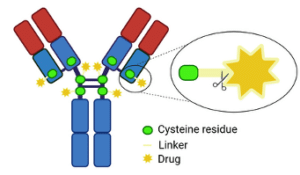Click the Aboriginal Cancer tab above for detailed information about research into cancers and Aboriginal people.
Translational Oncology Research Projects
Aboriginal Cancer Research
Antibody Drug Conjugates (ADCs)
New tests to find who will benefit from an exciting new group of cancer drugs
The aim of this work is to gain new knowledge on how to select people who will benefit from a new type of drug (ADCs). We also want to learn why ADCs do not work in all people so we can modify the drug, to ensure it works better for everyone in the future.
Usual chemotherapies reach and enter normal cells and cancer cells equally and so often have side effects. A new group of drugs, called antibody drug conjugates (ADCs), have a chemotherapy drug joined to an antibody which seeks out and attaches to chemicals outside of cancer cells. This unique design helps these drugs kill cancer cells and leave normal cells unharmed. In trials of breast cancer and bladder cancer, these drugs have shown big benefits.
Although these treatments are effective, they are also very expensive, costing over $150,000 a year and may still have significant, and occasionally fatal, side effects. They also do not work for everyone, and we have no reliable way to determine who they will or will not work for.
This project will study patients with breast cancer being treated with an effective ADC targeting a cancer cell chemical called HER2. Surprisingly, this drug can work very well when there is a lot, a little or no HER2.
The first part of this study will look at:
- how fast HER2 is made and used by breast cancer cells
- what other chemicals on cancer cells affect how these new drugs work
- whether HER2 on the inside of cells is important, and
- if results are worse if the HER2 is missing from some areas of a cancer.
The second part will use special scans which can show where areas of cancer are and if they have the HER2 chemical.
 This image is an example of a cancer drug (an antibody drug conjugate). This drug is made of a humanised antibody that targets cancer cells specifically, a linker molecule, and chemotherapy/cancer drug payload. Once the antibody seeks out and binds to cancer cells, it moves inside the cell, releases the drug and kills the cancer cell.
This image is an example of a cancer drug (an antibody drug conjugate). This drug is made of a humanised antibody that targets cancer cells specifically, a linker molecule, and chemotherapy/cancer drug payload. Once the antibody seeks out and binds to cancer cells, it moves inside the cell, releases the drug and kills the cancer cell.
Statins to treat breast cancer
Exploring the benefits of drugs used to treat high cholesterol in breast cancer treatment
The goal is to predict which types of breast cancer will benefit from treatment with statins based the protein markers we are studying.
The speed of growth and multiplication in cancer cells means they need to change the way they use nutrients. Cancer cells are different to normal cells because they need to create building blocks to allow production of new cells while at the same time producing enough energy to survive. These changes in cancer cells create weaknesses we can exploit to kill them. In particular, cancer cells need to use a type of sugar called glucose to generate energy while also using it as a building block to make cholesterol, which is vital to creating new cells. If we can interfere with the way cancer cells do this, we could have an effective way to treat cancer with low side effects.
Several studies have looked at a type of drug that interferes with this area of glucose use, the statin drugs, which treat people with high blood cholesterol. Statins appear to reduce the risk of breast cancers as well as reduce deaths in people who already have breast cancer. However, it is uncertain which types of breast cancer benefit, and there are hints from breast cancer shrinkage studies that, although overall results are improved, a few cancers could be made worse by these drugs. As a result, these drugs are not currently used to benefit breast cancer patients.
Our study will look at a large group of 2500 patients which includes all the different types of breast cancer. From medical records, we also know which patients received statin treatment and how long they survived. We will then study the effects of statins in the whole group to find out which types of breast cancer benefit.
 We have also previously discovered two new proteins in the laboratory; one called BMP4 which stops cholesterol being made and stops breast cancer spreading, and a second called AAMDC which switches on the production of cholesterol and also accelerates cancer growth. We will plan to study these new proteins as well as three other proteins well-known to be important in general glucose and cholesterol usage. We believe that testing amounts of some or all of these proteins in a persons cancer may tell us which patients will benefit from statin therapy.
We have also previously discovered two new proteins in the laboratory; one called BMP4 which stops cholesterol being made and stops breast cancer spreading, and a second called AAMDC which switches on the production of cholesterol and also accelerates cancer growth. We will plan to study these new proteins as well as three other proteins well-known to be important in general glucose and cholesterol usage. We believe that testing amounts of some or all of these proteins in a persons cancer may tell us which patients will benefit from statin therapy.
We will use the results to guide a clinical trial of statins (given in addition to normal breast cancer treatment) for those who are likely to benefit and avoid those will not.
